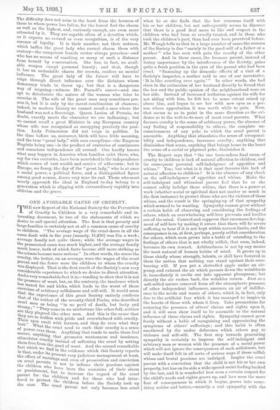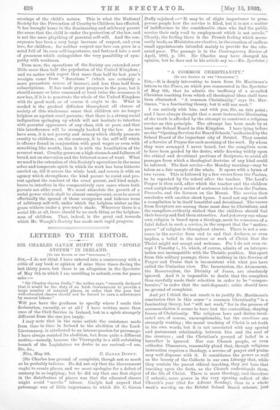ONE AVOIDABLE CAUSE OF CRUELTY.
THE new Report of the National Society for the Prevention of Cruelty to Children is a very remarkable and in- teresting document, to two of the statements of which we desire to call special attention. The first is that poverty and large families is certainly not at all a common cause of cruelty to children. " The average wage of the cruel-doers in all the eases dealt with in the year [namely, 11,336] was 25s. a week ; average family not quite three; while the average wages in the prosecuted cases was much higher, and the average family lunch lower, both of which facts become still more striking as the crimes become more serious." In other words, the worse the .ereelty, the better, on an average, were the wages of the cruel Parent and the fewer were the children to whom the cruelty Was displayed. That is the first result of the Society's now very considerable experience to which we desire to direct attention. And a very remarkable fact it is,—tending to show that it is not has Pressure of want, but, on the contrary, the insolence which u4s waxed fat and kicks, which leads to the worst of these -exercises of arbitrary selfishness and self-will. It would seem that the experience of this great Society entirely confirms ottuaetlof the author of the seventy-third Psalm, who described -etrong42; :4 as being "in no peril of death, but lusty and
" They come in no misfortune like other folk, neither r a they plagued like other men. And this is the cause that are
Their • se holden with pride and overwhelmed with cruelty. oyes swell with fatness, and they do even what they What the cruel need to curb their cruelty is a sense oLuprower over them. Anything that tends to make them feel stimulates cruelty ruYeelythingt that promotes wantonness and insolence, instead of softening the cruel by setting them free from the g. lead of want. And the second remarkable fact which we find
is that, under its in the evidence which this Society reports present very judicious management at least, the effect of warnings on cruel parents is not to even i
ven of prosecution and conviction inflame their passions against the children who have been the occasions of their alarm or punishment, but to increase the regard of the cruel parent for the children and for those who had inter- fered to protect the children before the Society took up the case. The cruel parent not Only becomes less cruel
when he or she finds that the law concerns itself with his or her children, but not unfrequently seems to discover that there is a good deal more to like and respect in the children who had been so cruelly treated, and in those who took the children's part, than had ever been perceived before. Mr. Waugh tells us that in a large number of cases the success of the Society is due "mainly to the good-will of a father or a mother " who has seen with pain the cruelty of the other parent. And in these eases, the humane parent, instead of losing importance by the interference of the Society, gains quite a fresh position in the eyes of the parent who had been cruel. "Summing up the domestic effects of a visit of a Society's inspector, a mother said to one of our secretaries, It is like courting over again.' " In other words, she had risen in the estimation of her husband directly he found that the law and the public opinion of the neighbourhood were on her side. Instead of increased irritation against his wife for not siding with him, he felt her to some extent raised up above him, and began to see her with new eyes as a per- son whose approbation it was worth while to gain. Now, that seems to us to point in the same direction as the evi- dence as to the well-to-do-ness of most cruel parents. What favours cruelty is the sense of arbitrary power, the absence of any feeling of responsibility to others, the complete un- consciousness of any yoke to which the creel parent is amenable. Anything that stimulates the sense of irresponsi- bility and independence, increases cruelty ; anything that diminishes that sense, anything that brings home to the heart the sense of a social or physical yoke, diminishes it.
The Report says that " the one tremendous final cause of cruelty to children is lack of natural affection to children, and its consequent parental self-indulgence of appetites and whims." Yes ; but what is it that most favours this lack of natural affection to children ? It is the absence of any check on the self-indulgence of appetites and whims. Make the self-indulgent and whimsical parent feel that he or she cannot safely indulge these whims, that there is a power at work (whether social or spiritual does not matter so much in the first instance) to protect those who are the victims of these whims, and the result is the springing-up of that sympathy which seemed to be wanting. Sympathy cannot grow without a certain habit of observing and considering the feelings of others, which an overwhelming self-love prevents and hustles out of the mind. Control and suppress that enormous develop- ment of self-love by making it aware that there will be severe suffering to bear if it is not kept within narrow limits, and the consequence is an, at first, perhaps, purely selfish consideration for others, which soon grows into a habit of attending to the feelings of others that is not wholly selfish, that soon, indeed, becomes its own reward. Arbitrariness is not by any means the most natural of human habits of mind. It grows up in those chiefly whose strength, talents, or skill have fostered in them the notion that nothing can stand against their over- bearing will. If you put a shrivelled apple under an air- pump, and exhaust the air which presses down the wrinkles in it, immediately it swells out into apparent plumpness ; but directly the air rushes back, the wrinkles return. Just so a self-willed nature removed from all the atmospheric pressure of other independent influences, assumes an air of indiffer- ence to the needs and wants of others, which is, in fact, only due to the artificial fear which it has managed to inspire in the hearts of those with whom it lives. Take precautions for restoring the pressure of others' claims and rights upon it, and it will soon show itself to be amenable to the natural influence of those claims and rights. Sympathy cannot grow freely without a habit of recognising and appreciating the symptoms of others' sufferings ; and this habit is often smothered by the undue deference which others pay to violence and self-will. The first step towards generating sympathy is certainly to impress the self-indulgent and arbitrary man or woman with the presence of a social power which will not ignore the consequences of such selfishness, but will make itself felt in all sorts of serious ways if these selfish whims and brutal passions are indulged. Inspire the cruel parent with a conviction that the child is not his or her own property, but has on its side a widespread social feeling backed by the law, and it is wonderful how soon a certain respect for the child's needs and rights grows up, and how soon the mere fear of consequences in which it begins, grows into some- thing nobler and better,—namely, a real sympathy with the
cravings of the child's nattire, This is what the National Society for the Prevention of Cruelty to Children has effected. Tt has brought home to the domineering and arbitrary parent the sense that the child is under the protection of the law, and is not the mere plaything of parental self-will. And the con- sequence has been a very large increase of respect, and even love, for children ; for neither respect nor love can grow in a mind full of its own self-importance, and fattened into a sort of grossness which extinguishes the very possibility of sym- pathy with weakness.
Even now, the operations of the Society are extended over little more than half the population of the United Kingdom ; and we notice with regret that more than half its last year's receipts came from " donations " (which are certainly a more precarious source of income), and less than half from subscriptions. It has made great progress in the year, but it should sooner or later command at least twice the resources it now has, if it is to penetrate the whole of the United Kingdom with its good work, as of coarse it ought to do. What is needed is the gradual diffusion throughout all classes of society of this wholesome sense that children are no longer helpless as against cruel parents ; that there is a strong social indignation springing up which will not hesitate to interfere with parental oppressors of any class, rich or poor, and that this interference will be strongly backed by the law. As we have seen, it is not poverty and misery which chiefly promote cruelty to children ; on the contrary, it is the self-will which is oftener found in conjunction with good wages or even with something like wealth, than it is with the humiliation of the severest want. Cruelty grows on a high stomach and fullness of bread, not on starvation and the bitterest sense of want. What we need is the extension of this Society's operations in the same sober and temperate spirit in which its work has been hitherto carried on, till it covers the whole land, and covers it with an agency which strengthens the kind parent to resist and pro- test against the conduct of the cruel parent, and kind neigh- bours to interfere in the comparatively rare cases where both parents are alike cruel. We must stimulate the growth of a social power which shall be almost omnipresent, so as to arrest effectually the spread of those overgrown and hideous wens of arbitrary self-will, under which the helpless wither as the grass withers under a yew-tree's shade. Wherever there is a social life at all, there should be no such thing as the helpless- ness of children. That, indeed, is the great end towards which Mr. Waugh's Society has made such rapid progress.



































 Previous page
Previous page